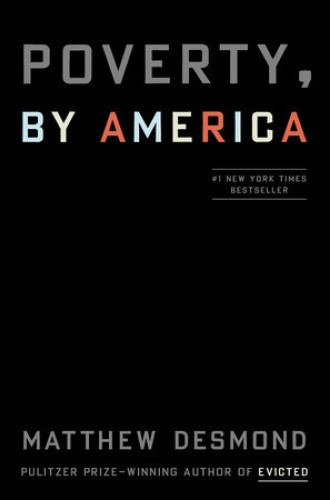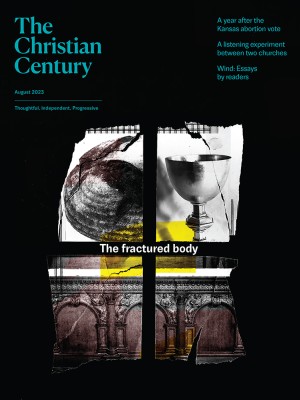Domestic poverty and who it serves
Matthew Desmond unties the knot of being poor in the US—and shows the rest of us that we hold the strings.
For generations, public and private efforts have sought to eradicate poverty in America. Government spending on anti-poverty measures has gone up, and the number of charitable agencies dedicated to helping poor people has grown. Yet the rate of poverty in the United States has remained largely unchanged over the last 50 years, while the wealth gap has widened considerably in that same time.
Sociologist Matthew Desmond’s new book explains why poverty persists despite—and because of—the things we do. Poverty, by America is a more expansive book than Desmond’s 2016 bestseller, Evicted, which chronicles the lives of those unable to find stable housing, those who profit at their expense, and the systems that entangle both groups. In this new book, Desmond examines the intricate web of visible and invisible forces that keep so many Americans poor. He presents poverty as “a tight knot of social maladies” and then disentangles them to show readers the different strands.
Read our latest issue or browse back issues.
Desmond writes from the rare perspective of an academic who experienced poverty and is still intimately close to those who are poor. This is not merely a topic of research for him. It’s personal, and this shows in his depiction of poverty as so much more than lack of money. In Desmond’s telling, poverty is pain, trauma, instability, fear, and a loss of liberty. It is living with perpetual embarrassment and shame. It is feeling like the government is against you, being surrounded by institutions that abuse you and force you to live with a diminished life and personhood, and facing constant barriers that keep you from flourishing into who you were created to be. Poverty, Desmond writes, is “material scarcity piled on chronic pain piled on incarceration piled on depression piled on addiction—on and on it goes.” The righteous anger in Desmond’s tone is impossible to miss and hard to critique. Ultimately, poverty is blasphemy against the imago Dei.
There’s another reason progressive Christians should find this book troubling. As Desmond unties the knot of poverty, he demonstrates that we—those of us “living lives of privilege and plenty”—hold the strings. Our country maintains political and economic systems that ensure that “some lives are made small so that others may grow.” These systems include our banks, tax codes, zoning laws, educational systems, and all the cheap stuff we buy every day. All are set up to reward the rich at the expense of the poor. Desmond lays out his argument clearly, and he supports it with comprehensive evidence (including 76 pages of notes).
Throughout history, the most consistent savior of the poor has been poor people themselves. But Desmond demonstrates how we have stripped away their power to organize and hindered their access to resources that could improve their lives. Public approval of labor unions is at its highest point since 1965, yet states continue to pass laws to disempower them. And when we do offer help, accessing that help is often humiliating or simply impossible. Hundreds of billions of dollars in benefits designated for poor people go unclaimed each year because of overly bureaucratic processes. Every year, $1.2 billion of aid goes to pay the lawyers who help poor people access those funds. For every dollar our country designates to help the poor, only 22 cents reaches those who need it.
At the same time, controls on the wealthy and corporations continue to erode. The IRS estimates that we lose over $1 trillion a year in unpaid taxes, largely to corporate tax cheats, yet Congress cut IRS funding in 2023. It is easy to point fingers at greedy firms, but most people with retirement accounts are shareholders of those corporations. We benefit from the tax cheats. In fact, the richest 20 percent of Americans receive most of the tax breaks, in various forms including mortgage interest deductions and tax breaks on college savings accounts, retirement savings, and health insurance.
Mainline Protestants are some of the wealthiest people in this country. According to a 2016 study by the Pew Research Center, the denominations whose members have the highest household incomes of all Christians are the Episcopal Church, where I work, and the Presbyterian Church (USA), my denomination. They are followed closely by the United Church of Christ, the Evangelical Lutheran Church in America, and the United Methodist Church. When these statistics are combined with Desmond’s argument, it becomes clear that we are the beneficiaries of the injustice we speak out against in our churches. The systems that fund our tithes are designed to keep poor people from rising.
But since we hold the strings to the poverty knot, we also hold the power to set them free. This is the most hopeful message of the book. We know how to end poverty, Desmond believes, and we have the means to do it. Poverty in America is not caused by a lack of resources; it’s caused by hoarding. Fighting it requires us to stop that hoarding and to demand the end of systems that benefit us. It also requires us to live out our personal conviction in public rather than hide in the comfort of collective privilege. We need a critical mass of Americans to demand an end to this injustice.
This is not a new challenge for progressive Christians. Sixty years ago in his “Letter from Birmingham Jail,” Martin Luther King Jr., citing Reinhold Niebuhr, reminded us that groups tend to be more immoral than individuals. As a group, financially comfortable Americans accept and profit from unjust systems. King also reminded us that privileged groups seldom give up their privilege voluntarily. Seldom, but it happens. White Christians have, at times, fought against the systems that privilege them.
For Desmond, the choice is clear: Will we go on living “knowing that our abundance causes others’ misery,” or will we demand an end to this injustice? This book should be read as a rallying cry to privileged Americans to do the latter. Desmond calls for a generation of poverty abolitionists. Like the abolitionists of days past, we need individuals with the moral clarity of our spiritual ancestors who saw evil and were not satisfied with reducing it. They sought to abolish it once and for all. Charity and kindness did not abolish slavery, nor will they end poverty. As Desmond puts it, “we don’t need to outsmart this problem. We need to out hate it.”
The God who inspired and sustained past abolitionists is doing the same for us. Desmond reminds us of the many Christians already in this fight, like William Barber and the Poor People’s Campaign. And the teachings of Jesus have prepared us for this. It will take faith to work toward something presently unimaginable, hope to know that it is possible, and love—that irrational emotion that leads us to sacrifice when there is nothing for us to gain, when there’s even something for us to lose. In America, abolishing poverty begins with loving our neighbors as we love ourselves.






